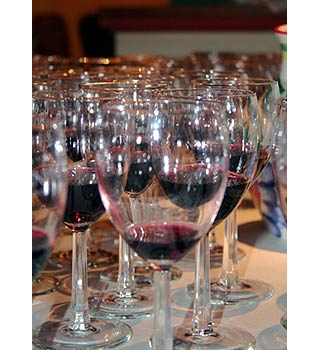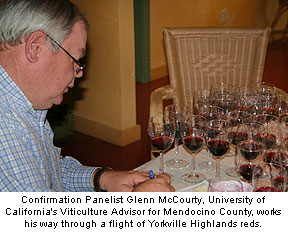Discovery Program

The clear and articulate voice of the Yorkville Highlands
by Thom Elkjer, Mendocino Regional Editor
Mendocino’s Yorkville Highlands has emerged as a grownup appellation which exhibits a clear and coherent regional signature in its wines irrespective of grape or producer.
Signature of the Appellation:
Yorkville Highlands wines offer a combination of rich, ripe fruit flavors balanced by vibrant acidity. Additionally the red wines offer generous, fruit-driven tannins and a touch of spicy minerality.
RECORD OF PROCEEDINGS
Tasting Date and Place: April 11, 2006 at The Boonville Hotel in Mendocino County.
It was yet another bleak, rainy morning in northern California when we convened for the 2006 Discovery Tasting of Yorkville Highlands appellation, an elevated, rugged coastal/interior winegrowing area located in southeastern Mendocino County not far from the border of Sonoma County. The calendar said it was spring, but the cold temperatures, bud-free vines and incessant rain said it was still winter.
In total, nine wineries were represented at the tasting, four of which are located within the appellation’s boundaries, and the rest in either other parts of Mendocino or Sonoma Counties, but sourcing and designating wines from the AVA.
We tasted the wines in two flights. The first included nine whites and two rosés. The second included 21 reds. Both flights were well variegated due to Yorkville Highlands’ mixed climatic characteristics. While almost all vineyards in the AVA are in a band of elevation between 900 and 1300 feet, differences in aspect, slope and wind exposure differentiate them strongly. As a result, the Highlands offer grape-growers cool-climate maritime qualities (not unlike those of Anderson Valley immediately to the northwest) as well as warm interior aspects (resembling those of upland areas ringing the Ukiah and Sanel valleys to the north) and various combinations in between.
Thus the white flight included Chardonnay, Sauvignon Blanc, Semillon and Viognier – as well as a pair of interesting white varietals rarely found in California, Symphony and Flora, two aromatic varieties developed at UC Davis by Dr. Harold Olmo. The red flight ranged from Pinot Noir (four bottlings) through all five red Bordeaux varieties (a dozen bottlings including several blends), to Syrah and Zinfandel. Considering the rugged, rural location and relatively undeveloped quality of the Yorkville Highlands AVA, the Tasting included a high percentage of wines made at wineries within the appellation: most of the whites and more than half of the reds.
A Clear Appellation Signature:
The signature that emerged for Yorkville Highlands did not lie in hiding for long. At the conclusion of the first flight of whites and rosés, the winemakers immediately began describing ripeness and richness in the fruit flavors in tandem with assertive acidity. “There’s a high malic acid content in the fruit that I like,” noted Deb Schatzlein. “Even when the pHs are high, the wines are still holding acid,” added Michael Scholz. “Balance is a relative term, and you can achieve it at a lot of different points on the scale,” Matt Meyer observed. Tom Rodrigues and Pete Opatz both noted the consistently engaging texture and understated minerality of the whites in particular.
After tasting the reds, the Discovery Panel spoke of the “dark, ripe fruit” in the wines and the “fruit-driven tannins” that made excessive oak unnecessary. “There’s a lot of October harvesting in this appellation,” Rodrigues observed, “and that late Indian Summer can be really warm up on the hilltops and ridges. So it’s not just the sugars that get ripe, it’s the tannins as well.” But not too ripe, several winemakers added. “Ripe has become a four-letter word,” Meyer noted sardonically. “These wines are not over the top.”
Both the tannins and the spiciness were fruit-driven, Schatzlein suggested, guessing aloud that few of the wines in the tasting had spent much time in new oak. She was right, as it turned out from a review of the data. Few of the reds had seen new oak, and even in those cases the percentage of new wood rarely topped 50%. Neutral French oak barrels were the most common cooperage in the Tasting.
There was some discussion of “rusticity” in the reds, particularly regarding the Syrahs and Zinfandels. “It’s more accurate to call it an ‘Old World’ approach,” Scholz suggested. “It’s a positive, spicy earthiness that suits these varieties well,” Opatz opined.
The findings of the Discovery Panel and Confirmation Panel were strongly consonant, both as to the specific appellation signature stated above and as to the generally high regard for the overall quality of the wines.
The conventional critique of Mendocino as a whole is that alongside the fully professional, high-quality wines coming out of the county there are still plenty of rustic, “individualistic” (i.e., flawed) wines made by producers oblivious to or unconcerned with consensus consumer taste in North America. I find this criticism harder and harder to validate, particularly for sub-appellations in the southern part of the County. There was not a flawed wine in the Tasting, nor anything remotely close to unpalatable. After the tasting proper had concluded, relieved members of both panels noted that they had brought with them low expectations (including fears of an “endurance test” and “a train wreck”) that proved completely unwarranted.
It’s worth noting in this regard that the appellation has recently become home to experienced, well-trained winemakers who have not yet released bottlings with the Yorkville Highlands designation on the label. When the work of these resident talents is reflected in future Discovery Tastings, the results for the appellation as whole can only continue to exceed expectations.
“It’s a fascinating area,” concluded Glenn McCourty, who lives in Mendocino County, grows his own grapes there, and advises winegrape growers throughout the county with the imprimatur of UC Davis. “The heat summation data [2700 to 3100 hours annually] say it’s perfect for Syrah and pretty good for Merlot, but in the right vintage Pinot Noir
Yorkville Highlands wines offer a combination of rich, ripe fruit flavors balanced by vibrant acidity. Additionally the red wines offer generous, fruit-driven tannins and a touch of spicy minerality.
Tasting Date and Place: April 11, 2006 at The Boonville Hotel in Mendocino County.
It was yet another bleak, rainy morning in northern California when we convened for the 2006 Discovery Tasting of Yorkville Highlands appellation, an elevated, rugged coastal/interior winegrowing area located in southeastern Mendocino County not far from the border of Sonoma County. The calendar said it was spring, but the cold temperatures, bud-free vines and incessant rain said it was still winter.
In total, nine wineries were represented at the tasting, four of which are located within the appellation’s boundaries, and the rest in either other parts of Mendocino or Sonoma Counties, but sourcing and designating wines from the AVA.
We tasted the wines in two flights. The first included nine whites and two rosés. The second included 21 reds. Both flights were well variegated due to Yorkville Highlands’ mixed climatic characteristics. While almost all vineyards in the AVA are in a band of elevation between 900 and 1300 feet, differences in aspect, slope and wind exposure differentiate them strongly. As a result, the Highlands offer grape-growers cool-climate maritime qualities (not unlike those of Anderson Valley immediately to the northwest) as well as warm interior aspects (resembling those of upland areas ringing the Ukiah and Sanel valleys to the north) and various combinations in between.
Thus the white flight included Chardonnay, Sauvignon Blanc, Semillon and Viognier – as well as a pair of interesting white varietals rarely found in California, Symphony and Flora, two aromatic varieties developed at UC Davis by Dr. Harold Olmo. The red flight ranged from Pinot Noir (four bottlings) through all five red Bordeaux varieties (a dozen bottlings including several blends), to Syrah and Zinfandel. Considering the rugged, rural location and relatively undeveloped quality of the Yorkville Highlands AVA, the Tasting included a high percentage of wines made at wineries within the appellation: most of the whites and more than half of the reds.
A Clear Appellation Signature:
The signature that emerged for Yorkville Highlands did not lie in hiding for long. At the conclusion of the first flight of whites and rosés, the winemakers immediately began describing ripeness and richness in the fruit flavors in tandem with assertive acidity. “There’s a high malic acid content in the fruit that I like,” noted Deb Schatzlein. “Even when the pHs are high, the wines are still holding acid,” added Michael Scholz. “Balance is a relative term, and you can achieve it at a lot of different points on the scale,” Matt Meyer observed. Tom Rodrigues and Pete Opatz both noted the consistently engaging texture and understated minerality of the whites in particular.
After tasting the reds, the Discovery Panel spoke of the “dark, ripe fruit” in the wines and the “fruit-driven tannins” that made excessive oak unnecessary. “There’s a lot of October harvesting in this appellation,” Rodrigues observed, “and that late Indian Summer can be really warm up on the hilltops and ridges. So it’s not just the sugars that get ripe, it’s the tannins as well.” But not too ripe, several winemakers added. “Ripe has become a four-letter word,” Meyer noted sardonically. “These wines are not over the top.”
Both the tannins and the spiciness were fruit-driven, Schatzlein suggested, guessing aloud that few of the wines in the tasting had spent much time in new oak. She was right, as it turned out from a review of the data. Few of the reds had seen new oak, and even in those cases the percentage of new wood rarely topped 50%. Neutral French oak barrels were the most common cooperage in the Tasting.
There was some discussion of “rusticity” in the reds, particularly regarding the Syrahs and Zinfandels. “It’s more accurate to call it an ‘Old World’ approach,” Scholz suggested. “It’s a positive, spicy earthiness that suits these varieties well,” Opatz opined.
The findings of the Discovery Panel and Confirmation Panel were strongly consonant, both as to the specific appellation signature stated above and as to the generally high regard for the overall quality of the wines.
The conventional critique of Mendocino as a whole is that alongside the fully professional, high-quality wines coming out of the county there are still plenty of rustic, “individualistic” (i.e., flawed) wines made by producers oblivious to or unconcerned with consensus consumer taste in North America. I find this criticism harder and harder to validate, particularly for sub-appellations in the southern part of the County. There was not a flawed wine in the Tasting, nor anything remotely close to unpalatable. After the tasting proper had concluded, relieved members of both panels noted that they had brought with them low expectations (including fears of an “endurance test” and “a train wreck”) that proved completely unwarranted.

It’s worth noting in this regard that the appellation has recently become home to experienced, well-trained winemakers who have not yet released bottlings with the Yorkville Highlands designation on the label. When the work of these resident talents is reflected in future Discovery Tastings, the results for the appellation as whole can only continue to exceed expectations.
“It’s a fascinating area,” concluded Glenn McCourty, who lives in Mendocino County, grows his own grapes there, and advises winegrape growers throughout the county with the imprimatur of UC Davis. “The heat summation data [2700 to 3100 hours annually] say it’s perfect for Syrah and pretty good for Merlot, but in the right vintage Pinot Noir





